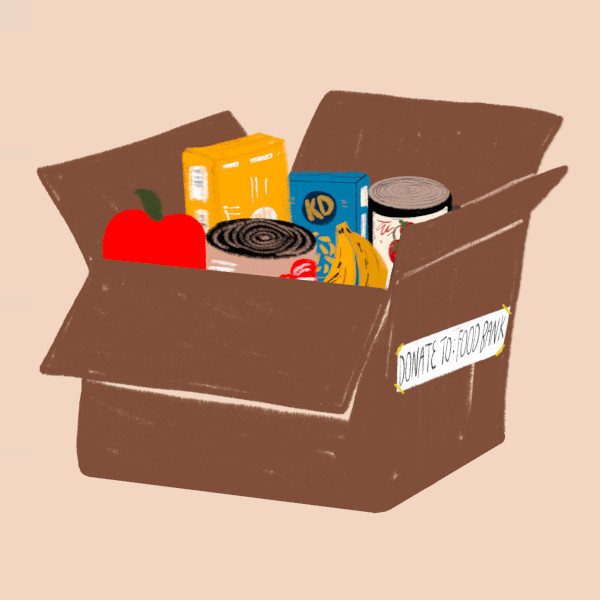‘A real crisis right now’
Food insecurity and inflation rise in Winnipeg
Illustration by Talia Steele
In the almost two years since, prices for food, rent, gasoline and other necessities have soared. A Statistics Canada report released earlier this fall states that groceries are increasing at a rate of 10.8 per cent year over year – the fastest since 1981.
Glynis Quinn, the executive director of 1justcity, an organization that supports three community drop-in centres, says the non-profit has seen an increase in people relying on their services.
“We’re seeing an increase at all of our sites,” Quinn says. “In terms of the number of people who are coming, it’s certainly back to pre-pandemic levels, but there’s a difference. People are really in need of food.”
Typically, people decide to forego more expensive grocery items, like fresh produce and meat. Since April of last year, the price of fresh fruit has gone up by 10 per cent, while fresh vegetables increased by 8.2 per cent.
“We’ve been told by our guests that they can’t afford to buy meat. They can’t afford to buy vegetables, and they can’t afford to buy fruit,” Quinn says. “It doesn’t take long to become malnourished, but it takes a long time to become nourished again.”
1justcity and other community organizations have seen a greater reliance on food-bank services.
Binara Hewagamage is the program manager at the University of Winnipeg Students’ Association, which runs a volunteer food bank in partnership with Harvest Manitoba.
While there can be a certain stigma around using food banks, Hewagamage encourages anyone in need to visit. “I know there (are) a lot of students that can use the help, but they kind of hesitate,” she says. “If you need the help, please come in … we’re welcoming everyone.”
The consequences of food insecurity are not limited to those in crisis. A lack of access to affordable and nutritious food affects the health and well-being of a community, which can have larger environmental and economic impacts on society as a whole.
“Food is a big issue for everyone, but I would say it’s not the only issue,” Quinn says. “It’s a cornerstone of what people need, but it’s only the beginning of what they need.”
However, one thing is clear. “We’re in a real crisis right now in terms of food,” she says.
University of Winnipeg students and downtown community members can register for the UWSA Foodbank by calling Harvest Manitoba at 204-982-3660. The food bank reopens on Oct. 21, and checkin for food distribution begins every Friday at 2 p.m.
Anyone who needs to access an emergency food bank can contact Harvest Manitoba directly or visit one of the supplemental-food resource centres listed on the UWSA website at theuwsa.ca/community-food-resources.
Published in Volume 77, Number 06 of The Uniter (October 20, 2022)







